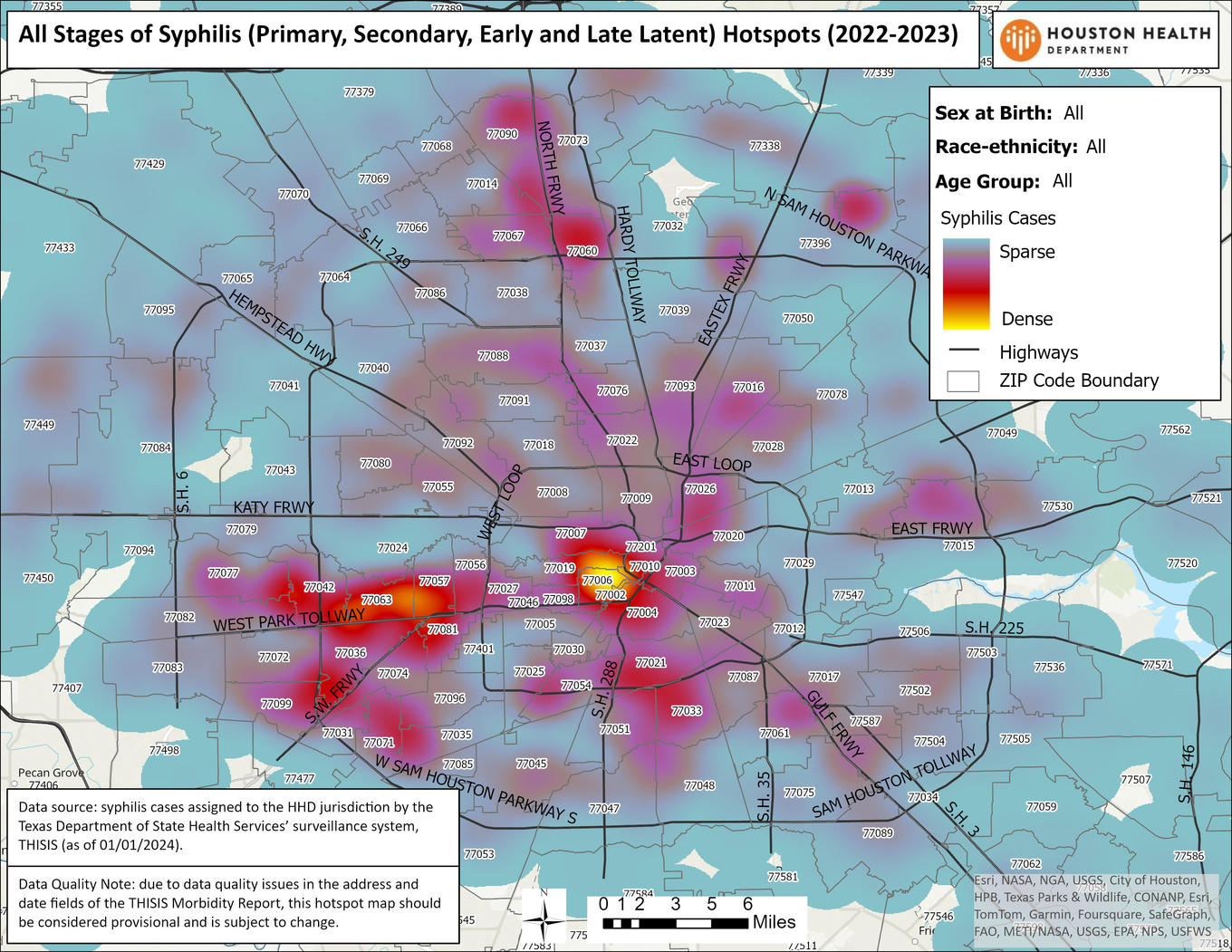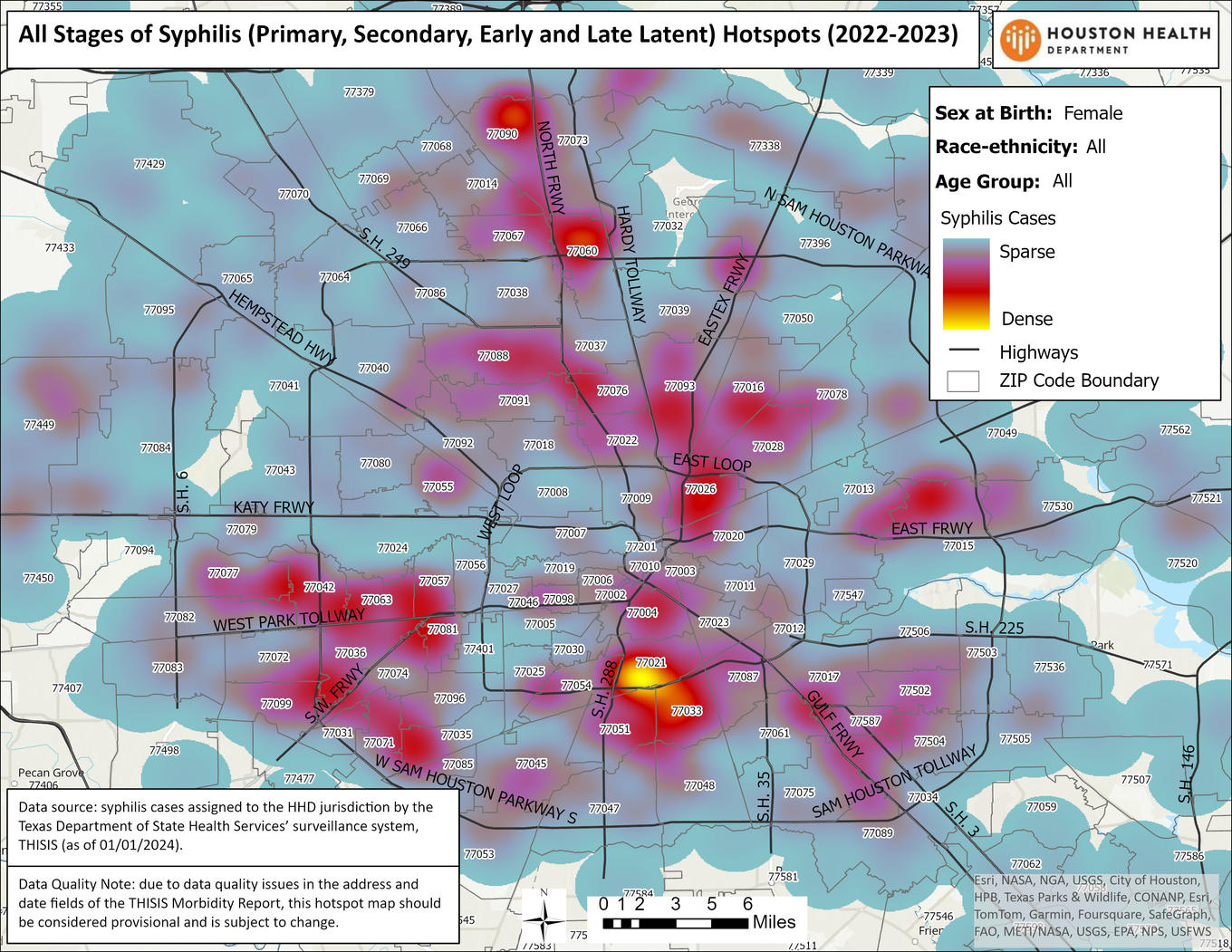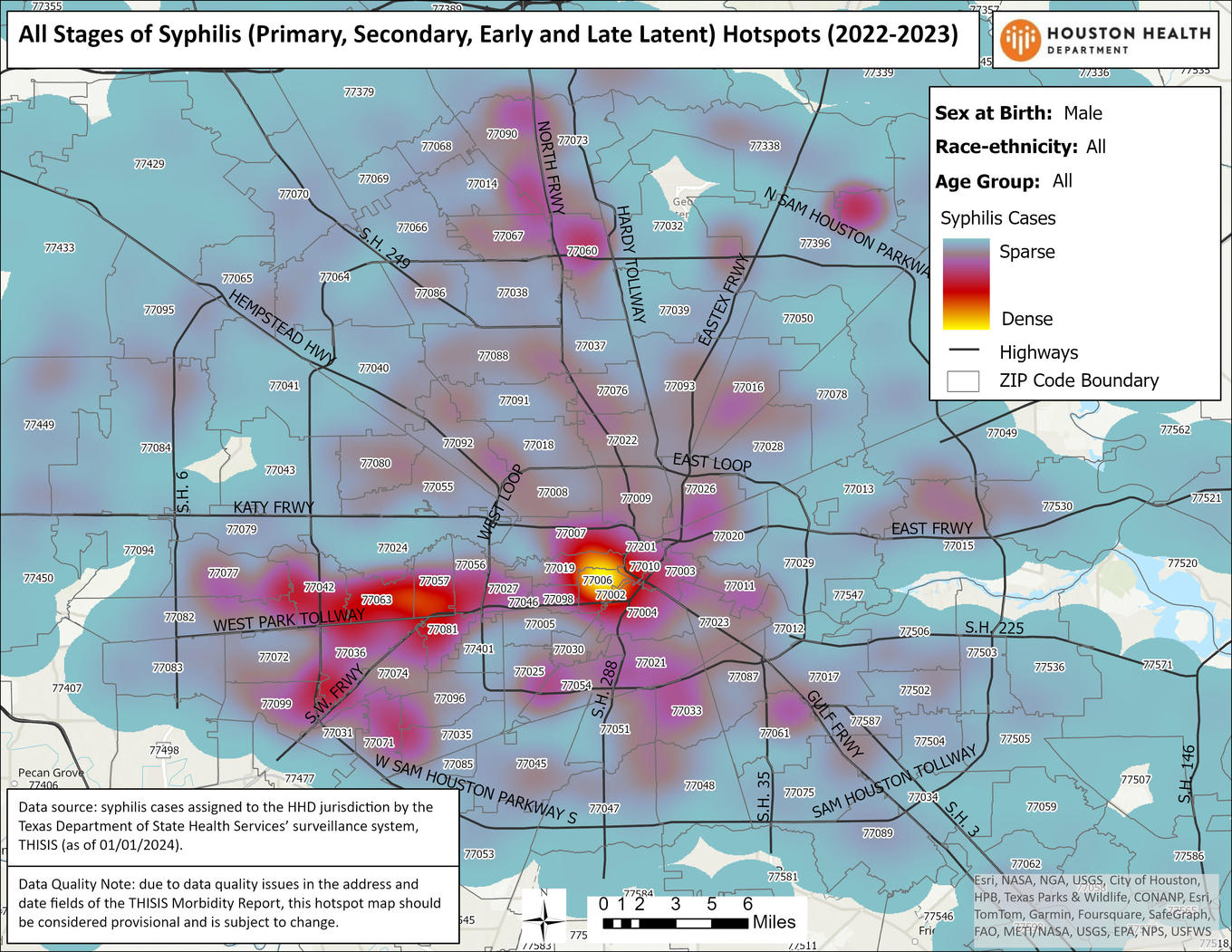HHD Call Center
Phone: 832-393-4220
Healthcare Provider Reporting
Provider eFax: 832-395-9683
Provider phone: 855-264-8463
Learn about My Prenatal Promise
Resources
Page last reviewed: June 3, 2024
Syphilis Testing and Treatment

What is syphilis?
Syphilis is a bacterial sexually transmitted infection (STI) that can cause serious health problems if left untreated. Infection develops in stages (primary, secondary, latent, and tertiary). Each stage can have different signs and symptoms.
Where can I get tested for syphilis?
We offer syphilis testing at these locations:
Walk-ins welcome. No appointment needed. Call for info (all locations): 832-393-5427.
Frequently asked questions
Who should be tested for syphilis?
- Pregnant women are required to be tested in the first and third trimester.
- Persons engaging in unprotected sexual contact.
- Men who engage in anonymous sex.
- Persons with multiple sex partners.
- Persons recently diagnosed with any other sexually transmitted disease such as gonorrhea, Chlamydia or HIV.
How do people get syphilis?
Syphilis is passed from person to person through direct contact with a syphilis sore. Sores occur mainly on the external genitals, vagina, anus, or in the rectum. Sores also can occur on the lips and in the mouth.
Transmission of the organism occurs during vaginal, anal, or oral sex. Pregnant women with the disease can pass it to the babies they are carrying.
Syphilis cannot be spread through contact with toilet seats, doorknobs, swimming pools, hot tubs, bathtubs, shared clothing, or eating utensils.
What are the signs and symptoms of syphilis?
There are four stages of syphilis (primary, secondary, latent, and tertiary). Each stage has different signs and symptoms.
Primary Stage
During the first (primary) stage of syphilis, you may notice a single sore or multiple sores. The sore is the location where syphilis entered your body. These sores usually occur in, on, or around the
- penis
- vagina
- anus
- rectum
- lips or in the mouth
Sores are usually (but not always) firm, round, and painless. Because the sore is painless, you may not notice it. The sore usually lasts 3 to 6 weeks and heals regardless of whether you receive treatment. Even after the sore goes away, you must still receive treatment. This will stop your infection from moving to the secondary stage.
Secondary Stage
During the secondary stage, you may have skin rashes and/or sores in your mouth, vagina, or anus. This stage usually starts with a rash on one or more areas of your body. The rash can show up when your primary sore is healing or several weeks after the sore has healed.
The rash can be on the palms of your hands and/or the bottoms of your feet and look
- rough
- red or reddish-brown
The rash usually won’t itch, and it is sometimes so faint that you won’t notice it.
Other symptoms may include:
- fever
- swollen lymph glands
- sore throat
- patchy hair loss
- headaches
- weight loss
- muscle aches
- fatigue (feeling very tired)
The symptoms from this stage will go away whether you receive treatment. Without the right treatment, your infection will move to the latent and possibly tertiary stages of syphilis.
Latent Stage
The latent stage of syphilis is a period when there are no visible signs or symptoms. Without treatment, you can continue to have syphilis in your body for years.
Tertiary Stage
Most people with untreated syphilis do not develop tertiary syphilis. However, when it does happen, it can affect many different organ systems. These include the heart and blood vessels, and the brain and nervous system. Tertiary syphilis is very serious and would occur 10–30 years after your infection began. In tertiary syphilis, the disease damages your internal organs and can result in death. A healthcare provider can usually diagnose tertiary syphilis with the help of multiple tests.
Is there a cure for syphilis?
Yes, syphilis is curable with the right antibiotics from your healthcare provider. However, treatment might not undo any damage the infection can cause.
Syphilis toolkit
Resources for providers
Video
Syphilis outbreak response town hall
A recording of the most recent community stakeholder town hall from May 8th, 2024. Updates regarding the Houston Health Department’s efforts in response to the syphilis outbreak were provided, along with a brief policy overview of the laws surrounding HIV/STI testing in Texas.
Provider-level basic overview
Provider-level basic overview of diagnosing, testing, and treating syphilis, along with a brief overview of local data and the Houston Health Department’s outbreak response strategy.
Syphilis heatmaps
Syphilis cases assigned to HHD jurisdiction by Texas Department of State Health and Human Service surveillance system (as of 01/01/2024).
Podcast Series: Congenital Syphilis — Exploring an Epidemic
Congenital Syphilis — Exploring an Epidemic is a podcast series designed to increase awareness and build a shared knowledge in the management and prevention of syphilis and congenital syphilis for providers who care for people of reproductive age and their babies. The series focuses on key strategies for providers, clinical administrators, clinic support staff, disease intervention specialists, and the community to decrease the rising rate of syphilis and congenital syphilis in Texas. This effort aims to enhance syphilis screening, timely syphilis treatment and work collaboratively to prevent new cases of congenital syphilis.
The podcast is a collaborative effort with the Texas Department of State Health Services Congenital Syphilis team, Public Health Follow-Up staff, and Denver Prevention Training Center. Listeners can find the podcast on the Texas DSHS HIV/STD Congenital Syphilis web page and podcast platforms such as Apple, Spotify, and Google podcast by searching, Exploring an Epidemic: Congenital Syphilis in Texas.
Other HHD services
Health Education
We offer a wide selection of free health education courses on the topics of hypertension, obesity, and tobacco use to community members of all ages.

HIV/STI Mobile Clinic
HIV/STI mobile clinic in Houston, Texas.

Health Centers
We provide patient services to meet the community’s present and future needs in family planning, immunizations, tuberculosis diagnosis, care for sexually transmitted diseases, and dental care.




